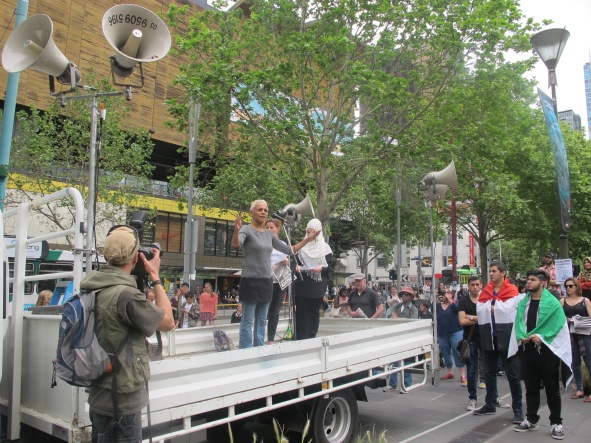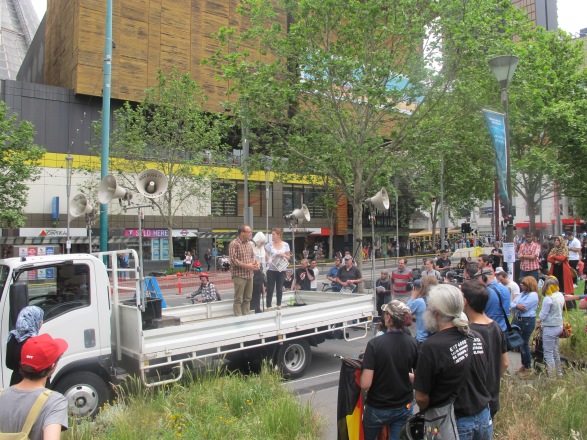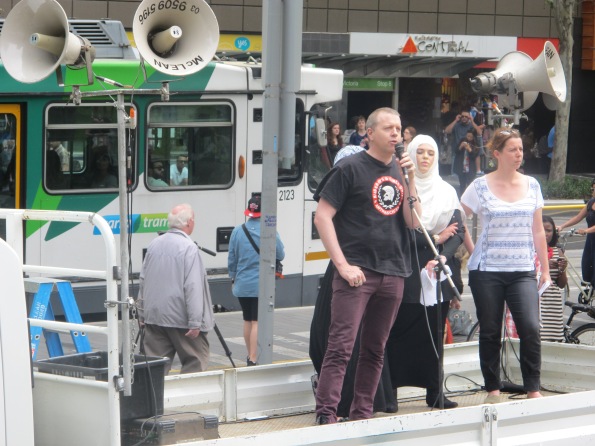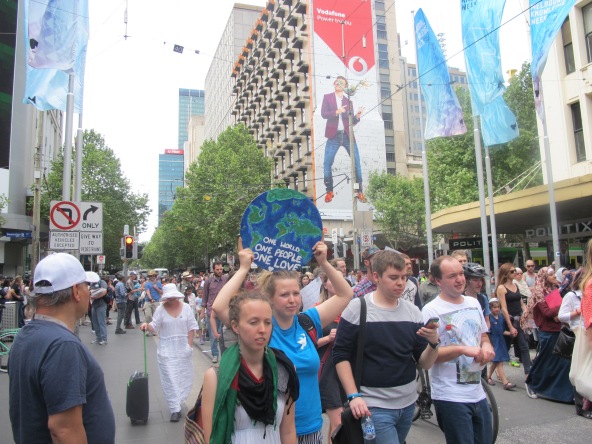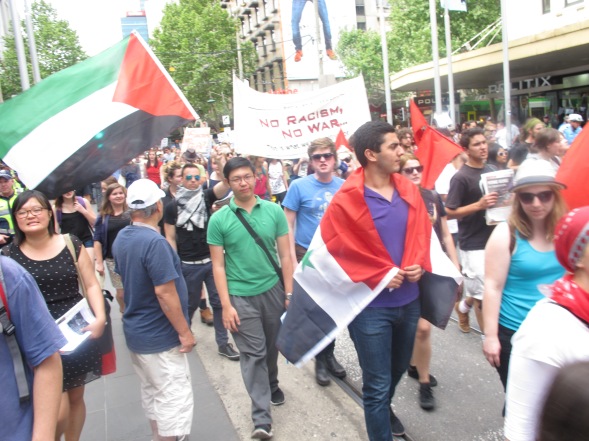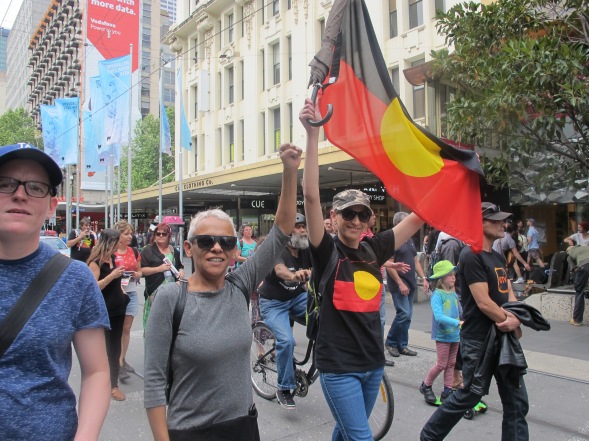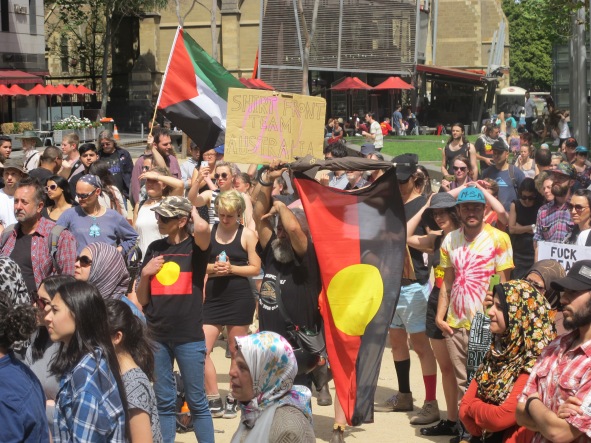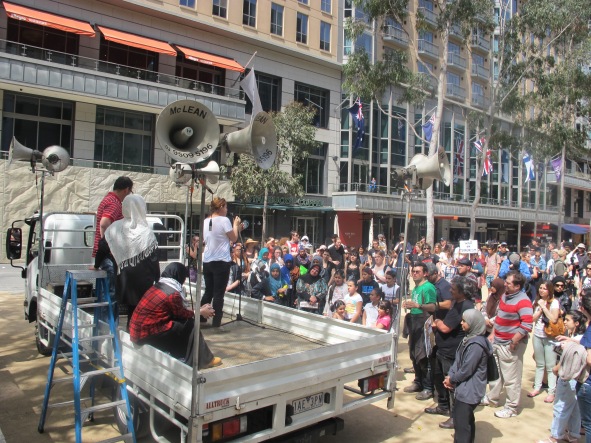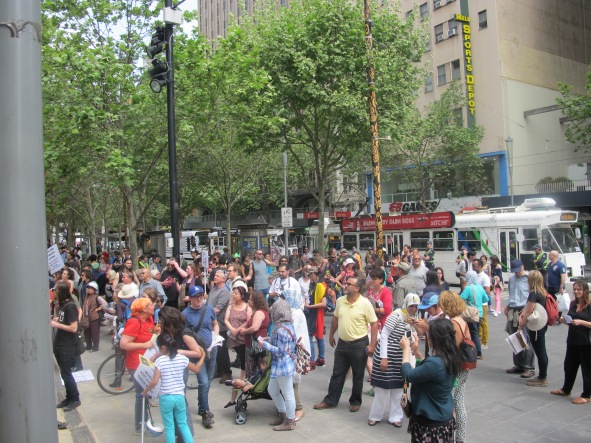Dear friends,
I should have posted this excellent article by Aboriginal activist and writer, Celeste Liddle, up some weeks ago. When I first read Celeste’s article on fair skinned privilege, it had me in tears. As I wrote at the time in another forum, it is a controversial piece but Celeste deals with the issues in a very sympathetic and considered way.
As someone who is lightskinned and identifies as Aboriginal, while the whole article touched me deeply, it was especially the first half of it that brought me to tears. Here Celeste speaks about Australia’s racist policies, assimilation, the historical experiences of light skinned Aboriginals, the loss of culture and much more and the impact that this has had on our sense of identity and belonging today.
Reading Celeste’s article and the beautiful story about her brother reclaiming and speaking Arrente brought forth a whole flood of memories about my own family and the impact of Australia’s racist practices:
It made me recall, in particular, one Invasion Day – perhaps 10 or so years ago now – that year it was very painful to attend Invasion Day, it all felt very raw to me – the loss of culture and the impact of Australia’s racist policies on my family. I was so angry that year, that I wanted to scream and yell and I recall deliberately starting a fight with my partner as a way of venting my frustration.
It made me recall when I worked at Old Parliament House giving political tours and racists would say derogatory things to me during the tours about Aboriginals and the Aboriginal Tent Embassy because they thought I was white and would therefore share their own racist attitudes.
It made me recall the 2000 Olympics when similar things were said to me on a bus when we passed the temporary Aboriginal embassy that had been set up in Sydney. Again the assumption was that I was because my skin colouring is light that I was “white” and therefore would share the same racist attitudes.
It made me recall, one year visiting my family in Queensland and my youngest sister’s little friend (I think they were both maybe 9 or 10 years old) couldn’t get her head around how I could possibly be Aboriginal and that I was my sister’s sister because I was light skinned, while my mother and two sisters had darker colouring.
It made me recall the story my mother would tell that when I was a baby and she would take me to the chemist to be weighed in the small outback Queensland town we lived in and the looks she would get and her defiantly saying: “what don’t you think a black woman can have a white baby”?
It made me recall how the last time I went home to visit my family, an ignorant arse attempted to accuse my mother of “reverse racism” and when I stepped in to defend her was told that it had nothing to do with me (because clearly I was “white”).
I do not share the above experiences in order to gain sympathy but instead to highlight and agree with the argument made by Celeste in her article. I agree with Celeste when she notes that skin colour, under capitalism, does remain a racial marker and that those of us who have lighter skin colour do not experience racism in the same way as those within the Aboriginal community who have darker colouring. However, the racism is still there, it simply manifests itself in a different way.
Please take the time to read Celeste’s excellent article. If you would like to read more of Celeste’s writings, you can check out her blog “Rantings of an Aboriginal Feminist” by clicking here.
in solidarity, Kim
ps: Celeste’s article has kicked off some debate, much of which has either misinterpreted her article or ignored what she wrote. If you would like to follow the debate, you can check out the updates on Celeste’s blog.
***
 (Photo: Celeste Liddle)
(Photo: Celeste Liddle)
Following on from my article about why I prefer the term “black”, I encountered what I can only describe as an unexpected and actually quite upsetting response via Twitter. It was unexpected because it came from members of the migrant community; a community which, on the most part, I have experienced as strong allies. It was upsetting because no amount of explanation from an Indigenous perspective seemed to satisfy. There was a barrow to be pushed and it needed to be pushed at all costs. I write this piece not to cause division, but rather to use this opportunity to educate in the hope that the knowledge of people is expanded.
It started as an initial long Tweet that I was sent, but from there it developed into a long twitter exchange. At no point throughout this exchange did I get the sense that any of the points I had raised from an Indigenous perspective were taken on board. This long tweet, minus identification and lead-in paragraph is below:
You’ve made some comments that indicate that you regard it as ‘old fashioned’ or ‘wrong’ to use skin colour as a marker of race. However, if you deny skin colour as a marker of race, then you deny an important aspect of Blackness.
Being darker doesn’t make you more Black, but it does make you, all other things being equal, more discriminated against. To deny that is to deny your privilege: not privilege of class, education or profession, but privilege of skin colour.
There are countless different ways to be Black and not all of them are visible. But denying visibility in Blackness reminds me of whites who claim to be colour-blind. In doing so, they deny other people’s experience.
I think the reason why this means so much to me is that I have no shared culture, no shared history, no shared community or any of what you consider to be contemporary or valid Blackness. Just skin colour.
Now before I go further, it should be highlighted that my article, which was completely about Aboriginal and Torres Strait Islander identity, and which used many of our descriptive terms, our language and our experience to highlight this fact was interpreted, as was made clear in the residual tweets, to have impact for non-Indigenous communities of colour. I never set out to represent these viewpoints in my piece. I do not have the required background to represent these views from a first-hand experience. Considering that our media is dominated by white males writing about everyone else, I would much rather read those perspectives first-hand rather than silence the voices by hazarding guesses at what their views might be. Likewise, I expect that people would recognise that I am coming from the perspective of an educated Arrernte woman of the hard-left persuasion who lives in the city, recognise how rare those voices are in the media, and not contribute to the silencing. It was unfortunate that this didn’t happen.
To start with the point regarding how skin colour is a racial marker and there is a privilege associated with lighter skin, I didn’t deny this in my responses although I tried to highlight from an Indigenous perspective why the situation was more complicated. I just got walls. This was why I ended up putting a stop to the conversation. To put it simply, I don’t disagree with Dallas Scott when he highlights how skin colour seems to be associated with greater financial disadvantage, lower educational attainment and social ostracism, although I would argue that factors such as remoteness and mainstream ignorance also come into play. I’m 100% certain that skin colour was the reason why Jack Charles and Gurrumul Yunupingu were denied taxis. Their visibility is undeniable.
However, fair skin privilege from an Indigenous perspective is incredibly limited. The view expressed by the long tweet completely ignores the many assimilation practices that fairer skinned Aboriginal people have been exposed to in this country, such as the “Stolen Generations”. Children of fairer skin being ripped away from their darker parents in order to be trained up in domestic chores and farmhand duties so they could then be given to settler communities as free labour.
 Fair skinned children being blackened up with charcoal by the parents in the hope that the government officers would not notice their colouring. Children being belted for speaking their language and forced to abandon language, culture and family in order to avoid punishment. Living conditions so abhorrent that a dog would turn it’s nose up at them. Don’t believe me? Here is my grandmother, who was a member of the Stolen Generations, talking about the experience in her own words. It didn’t end with my grandmother either. My father was a welfare kid who ended up with some siblings in The Convent School in Alice Springs where they were also punished severely for expressing language and culture. Recently my brother, at my father’s birthday, delivered a speech where he gave the first paragraph in Arrernte. I cannot not tell you how that felt. For two generations children in my family were denied the right to speak language because they were wards of the state and here’s my brother, at nearly 30 years old, reclaiming this language so that his siblings and his son are not also denied it. It’s for these reasons that you see so many fairer skinned Aboriginal people fighting so damn hard to reclaim language, family and culture. By virtue of skin colour many were denied these things. This is not an experience within the borders of this country that translates readily to a migrant experience.
Fair skinned children being blackened up with charcoal by the parents in the hope that the government officers would not notice their colouring. Children being belted for speaking their language and forced to abandon language, culture and family in order to avoid punishment. Living conditions so abhorrent that a dog would turn it’s nose up at them. Don’t believe me? Here is my grandmother, who was a member of the Stolen Generations, talking about the experience in her own words. It didn’t end with my grandmother either. My father was a welfare kid who ended up with some siblings in The Convent School in Alice Springs where they were also punished severely for expressing language and culture. Recently my brother, at my father’s birthday, delivered a speech where he gave the first paragraph in Arrernte. I cannot not tell you how that felt. For two generations children in my family were denied the right to speak language because they were wards of the state and here’s my brother, at nearly 30 years old, reclaiming this language so that his siblings and his son are not also denied it. It’s for these reasons that you see so many fairer skinned Aboriginal people fighting so damn hard to reclaim language, family and culture. By virtue of skin colour many were denied these things. This is not an experience within the borders of this country that translates readily to a migrant experience.
Additionally, whilst I never denied skin colour as a marker, and whilst I also don’t deny the existence of some fair skin privilege in the some ways, what about visiting the concept of “migrant privilege”? The White Australia Policy existed until the early 1980s yet from the 1940s onwards, following the impacts of wars, it was chipped away at bit by bit. Non-white immigrants were eventually accepted into the country in various “waves” to the point of Malcolm Fraser openly supporting multiculturalism and opening up the refugee programmes to many Asian nations. This country has gone so far backward since this time with elections being won on the basis of “stopping the boats” that I am disgusted to live in it. Yet, here’s the thing: my father, despite being born in this country and having ancestors that had been born in this country for roughly 4000 generations, was not counted in the census as a citizen of this country until he was 17 years old. This is why I have problems with the term “First Australians”. Each successive wave of immigrants became Australians before the First Peoples, regardless of skin colour, were recognised as human beings. Therefore, migrant communities, whilst actively discriminated against by other Australians and enduring vast poverty, racism, ostracism and countless other things, also had more rights in this country than the First Peoples.
I state this not to be inflammatory. Rather it is a simple historical fact and one I believe that the majority of people living in this country are unaware of. They are not aware that one of the wealthiest countries in this world has third world conditions tucked away far from the visible eye. They are not aware that trachoma and other third world diseases are still an issue here. They are not aware and I am not surprised. Why? Because this country continually fails to acknowledge its own history and even goes to the extent of suppressing it by referring to the negatives as “black armband history”; therefore there is no value for national pride to revisit this stuff. Everyone who lives here benefits from stolen lands for which treaties are yet to be negotiated, massacres, frontier wars, assimilation policies and the displacement of original peoples. Including Indigenous peoples that live on lands other than homelands (yep, this would be me). Yet the broader knowledge of this is so severely lacking. Sometimes a simple acknowledgement is all that it takes to make the day of an Indigenous person struggling for recognition.
One final point, throughout the course of the tweeting, the dissenting voices referred to themselves as “Black Australians” and I feel the need to claim sovereignty here. To me this was no different than seeing Andrew Bolt referring to himself as an “indigenous Australian”. It diminishes our importance as First Peoples of this country. Aboriginal and Torres Strait Islanders are the “Black Australians”. Migrants of colour are black people who have made Australia their home and have become “Australians” therefore accepting this country as it stands: a place which was wrongfully declared Terra Nullius and was taken without the consent of the First Peoples. There is a difference. We use “black” as a way of highlighting our experiences as a result of, or in contrast to “White Australia”. The lack of general population knowledge due to national denial when it comes to our unique struggles is why I feel that this distinction is sometimes unknown and needs to be explained.
I wish to apologise to the many comrades and allies I have within the migrant communities for the existence of this blogpost. Know how much I value you, your support and your commitment to fighting side-by-side for recognition in this country. This is not a blogpost that is written for you. Rather it is written for others who, sometimes through no fault of their own, do not possess this knowledge. Who would make comments such as encountered above without realising just how limited and uneducated on the plight of First Peoples these comments are. Who accept this country as their home with a dominant power to struggle against for recognition yet fail to delve into intricacies of the experiences of First Peoples. I hope this post assists in their acquisition of knowledge.
Finally, I look very much forward to reading more about the experiences of migrant communities in this country. I want to read a hell of a lot more about the unique experiences of racism, the ostracism and the intricacies from these voices. I WANT to read about skin colour and how this manifests as a site of repression from a migrant perspective. If I had my way, the dominant white, middle-class, right-wing male voices would be sidelined in the media in favour for diversity and the sharing of true knowledges. I will never, however, be representing these voices myself in my writings. As First Peoples whose experience is almost always denied, we’ve got our own stories to tell and I am not the right person to be telling the stories of others. With respect.
———————————————————————————–
